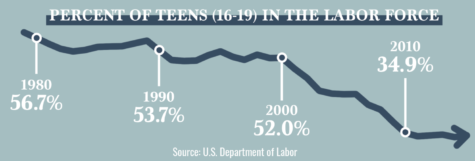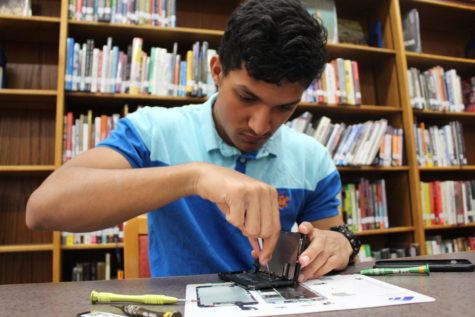Teenagers developing unconventional businesses
How technology, social media are transforming high school jobs
November 1, 2019

The new workforce
Coppell High School junior Vijay Sridharan carefully unscrews the screen of an iPhone and assesses the damage inside. He deftly replaces the camera module and uses a small screwdriver to tighten the new part in place.
For Sridharan, a phone and its spare parts are the only things he needs to do his job. He earns money from repairing damaged iPhones, laptops and gaming consoles, a business he began two years ago.
“Companies and technology these days fit all of these components in a small device,” Sridharan said. “Being able to open something up and understand how everything works in it is mind-boggling to me. I love that.”
There are approximately 3.5 billion people worldwide who actively use social media, amounting to about half of the global population (Global Digital Statshot Report, July 2019). The domination of social media is giving way to a generation that integrates these apps into daily life, and now, jobs. Beyond being a place to talk to people far away or share pictures, apps such as YouTube, Instagram, Snapchat, Twitter and Facebook allow people, especially teens, to build their own businesses.
Being able to open something up and understand how everything works in it is mind-boggling to me. I love that.
— Vijay Sridharan, CHS Junior
Instagram allows Sridharan to easily spread word about his business and receive customers, just as it does for CHS senior Jaron Menzimer. Menzimer is a photographer who started posting on his photography account, @jaronmenzimer, in 2016.
“Photography and visual art is becoming more popular on social media,” Menzimer said. “It’s a great platform to share your work. Nowadays with Instagram and Twitter, you have to have some sort of presence and you have to be pretty up-to-date depending on what you want to do.”
Menzimer does not limit himself to any one style: scenic landscapes, portraits and dramatic black and white shots all dot his feed. He finds clients for photo shoots through his account and has recently done a number of music coverage projects for Ellis Music Magazine.
“Depending on what it is, I’ll go out and shoot and pick out photos and share them with the clients and do social media,” Menzimer said. “I like that every time I shoot it’s a different experience. It’s never the same. It’s a very unique way of expressing how to see things. You can make it yourself and your own work.”

Coppell High School senior Jaron Menzimer makes money photographing other students and customers. Menzimer uses Instagram to promote his photography and reach new customers.
A job dependent on social media or technology may seem lazy to some, but it can be difficult to profit off of, according to Sridharan. Relationships are crucial to business. Building trust with customers and ensuring their satisfaction is especially necessary for a business starting out, as is looking at others in the field.
“For me, the hardest part of this job is finding the people,” Sridharan said. “Usually, people don’t trust outside sources for repairing their phones, so you have to build that trust and talk to them. You need to mark yourself as someone accountable. And if you find someone that’s doing the same thing you talk to them and make friends with them.”
However, the variety of online resources available makes establishing these connections easier. Garnering engagement from an audience through social media means consistent posting and awareness of how you are advertising yourself to the public.
“There’s no easy way out; it’s still a job that you have to work for,” Sridharan said. “What makes it easier is that we have access to so many resources, like the internet. You don’t have to find manufacturers, investors and customers for a business manually anymore.”
Influencers
Webspace is cluttered with mediums that vie for users’ attention, from YouTube, Instagram, TikTok and Soundcloud to a myriad of others. This pervasive nature of social media makes it difficult for people to stand out.
Those that do are called “influencers”, a diverse group that is getting younger and younger. It describes people who share their ideas and affect others with their platform. Kids see themselves – or who they want to be – in these content creators, and look to them for guidance and a way to form their worldview.
CHS senior Eduardo Vertti spends 3 to 5 hours each weekend scouting stores for thrifted clothing and accessories to stage and sell online. He started in 2016 on apps such as Grilld, Local and eBay, establishing himself on the London-based social shopping app Depop in 2017.

Vertti has sold at popup markets including the Dallas-Fort Worth Vintage Swapmeet and the Montreal Market in Houston. Depop has recently sponsored Vertti, making him a representative for its expansion to Texas.
“I’ve been fortunate to build a lot of connections and gain whole new opportunities from something I didn’t imagine having two years ago,” Vertti said. “But the hardest part is being tied to social media. I’m constantly having to check for notifications or how the market is doing. I’ll get a notification for an offer at 1 a.m. that I have to take in the moment. It’s something I’m tied to, and it’s a blessing and a curse for me.”
Taking away the screen between consumer and provider allows jobs in technology to create real-world connections.
“Being able to go to markets physically reminds me there are people who come [there] because of the pieces I or other people sell,” Vertti said. “It’s like a part of history and it connects to broader communities, whether that’s hip hop, archive pieces or streetwear.”
Attention spans are limited; captivating people for long periods of time requires persistence and creativity. Amassing the interest of followers takes time, and many find keeping that interest can be stressful.
Teens who build these businesses are creating an image of themselves when they may not know who they are or how they should act. Limiting this interaction to the screen makes it easy for teens to focus on the numbers: profit, likes, comments, follower count.
“I know people who are in [this market] solely for the money and they don’t care about anything else,” Vertti said. “They’re not people who truly experience or go through what everyone else did on the way up.”
Transforming the high school job
Technology makes equipment and media so readily available that the idea of amassing followers feels only a click away. Teens making money off of social media or technology is unique to this era – and is transforming the idea of a high school job.
People can make money sitting in their bedrooms or even at school, allowing for flexibility that physical businesses do not provide. Though these self-made occupations often lack monetary stability, they stem from passion, monetizing art or hobbies. According to the American Psychological Association (APA), finding meaning in work is proven to increase job satisfaction, empowerment and performance. While many teens may not make social media their career, it allows them to gain experience doing what they love.
Social media and technology culture has their negatives, but the teens who find success in those areas often influence their peers to attempt the same. Sridharan began fixing phones in 2017, when he learned from CHS 2018 graduate Dennis Onalaja.
“You’re not going to get what you want unless you ask people,” Sridharan said. “For about three weeks, [Onalaja and I] would go to Starbucks and he would teach me how to repair iPhones. He would make me do it over and over and over again and time me, so I would get perfect at it and faster, so customers could get their phones on the same day.”

Coppell High School senior Vijay Shridharan fixes a phone in the library during sixth period on Tuesday. Sridharan makes money by providing a cheaper option for phone repairs.
Major retailers and businesses are also looking for high school input to better connect with their audiences. The company is able to implement input from target age groups, and the teens giving input are able to learn about the structure of the business. CHS senior Sona Selvamani’s experience as a Nordstrom fashion ambassador allows her to see behind-the-scenes operations of a larger business.
“We decide what the mannequins wear, what the shop set-up is going to be, where all of the products go,” Selvamani said. “It’s supposed to be teenage insight on how the store works. There are fashion ambassadors for each major store. A lot of it is a marketing/merchandising type of class scenario, so they teach you a lot about how the store and business work.”
Teens are becoming a bigger part of business and industries; companies want the input of a vocal audience and the skills they have to offer. This transformation is helping reinforce connection and business-mindedness in teens.
“If I have one piece of clothing that can mean something to someone, overcharging or nearly scamming them just takes away the whole idea of what selling is for,” Vertti said. “Being able to build relationships with customers or even suppliers is really important, and I don’t think people realize that.”
Building a business also has the opportunity to pay off for college admissions. The variety of skills that sustaining a business demands allow a student to be well-rounded and show they are willing to take risks beyond becoming a part of existing organizations. Not only does it exemplify leadership and entrepreneurial skills, it shows institutions their career prospects are bright.
“Starting a business or doing a job requires responsibility and a level of maturity and that will impact their score in the holistic review process,” Texas A&M University director of prospective admissions Theresa Schmitz said. “They’re taking something that they’re interested in and taking that next step of starting a business. Both academics and extracurriculars are very important in our holistic review process, but starting a business is a good way to show leadership and entrepreneurship skills.”
Technology is a beacon of opportunity and is simultaneously reshaping industries and the lives of people globally. Younger generations building a platform for themselves on social media not only provides powerful learning experiences, but a sense of independence and reward unlike any other.
“The biggest thing I’ve learned from this job is no one’s going to do it for you,” Vertti said. “It’s just something you need to build on your own. It’s about learning it through experiences, whether that’s moments of loss of money, people who are inconveniences or nice to meet. Ultimately, being able to call yourself a self-established person for your main sources of income is really rewarding.”
Follow Shivi (@_shivisharma_) and @CHSCampusNews on Twitter.












